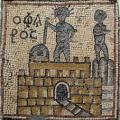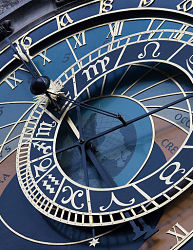98 - For a Limited Time Only: John Philoponus
John Philoponus refutes Aristotle’s and Proclus’ arguments for the eternity of the universe, and develops new ideas in physics.
Themes:
• F.A.J. de Haas, John Philoponus’ New Definition of Prime Matter (Leiden: Brill, 1997).
• J.F. Phillips, “Neoplatonic Exegeses of Plato’s Cosmogony (Timaeus 27C-28C),” Journal of the History of Philosophy 35 (1977), 173-97.
• Philoponus, Against Aristotle on the Eternity of the World, trans. C. Wildberg (London: 1987).
• Philoponus, Against Proclus on the Eternity of the World, trans. M. Share and J. Wilberding, 4 vols (London: 2005, 2005, 2006, 2010).
• Proclus, On the Eternity of the World, trans. H.S. Lang and A.D. Macro (Berkeley: 2001).
• R. Sorabji (ed.), Philoponus and the Rejection of Aristotelian Science (Ithaca: 1987, new ed. 2011).
• G. Verbeke, “Some Late Neoplatonic Views on Divine Creation and the Eternity of the World,” in Neoplatonism and Christian Thought, ed. D. O’Meara (Albany: 1982), 45-53.







Comments
Limited time only?
Why a limited time only? Is this a telemarketer trick to get us to listen?
Nevertheless, I liked the lecture. And I look forward to hearing Richard Sorabji!
In reply to Limited time only? by John Stamps
Limited time only
Well as usual the title is supposed to be funny, or at least wryly amusing. In this case it refers to the fact that he denies the eternity of the world (i.e. the world exists for a limited time only... get it? Hilarious!). Or maybe you knew that and you are just teasing me! Anyway glad you liked the episode.
Thanks,
Peter
In reply to Limited time only by Peter Adamson
:-)
:-)
In reply to Limited time only by Peter Adamson
Me being obtuse and literal
I was being obtuse and literal. Yes, it's funny. Not Whoopy Cushion funny. Philoponic wit worthy of the Grammarian.
In reply to Me being obtuse and literal by John Stamps
Funny
To be honest I'd take whoopie cushion funny. I'm not proud.
John Philoponus' other job
Hi Peter, although you of course mention the importance of Philoponus' Christianity in his philosophical project, it might be worth adding (in the written version) that he was a theologian too, and quite controversial at that. I don't in fact know how much of his theological work survives, but he was known as a champion of "Tritheism," a branch of Monophysitism that claimed that God was not one essence and three hypostases, but rather three essences and three hypostases. He also speculated on the nature of the resurrected body and wrote an explanation of the relation of the Jewish to the Christian Passover.
Nick
In reply to John Philoponus' other job by Nicholas Marinides
Philoponus' theology
Hi Nick,
Good point, you actually have spotted something I meant to do but didn't because of lack of space when I got to the Church Fathers. My original intention was to cover this side of Philoponus when I did the Trinity debates but I couldn't squeeze that in. Adding something in the book version is a good idea, thank you for reminding me!
Best,
Peter
In reply to Philoponus' theology by Peter Adamson
RE: Philoponus' theology
I just came across a recent article on Maximus Confessor vs. Philoponus that might be useful to you when you get around to the revision: Grigory Benevich, "Maximus Confessor’s polemics against Tritheism and his Trinitarian teaching," Byzantinische Zeitschrift 105/2 (Dec. 2012): 595-610.
Paganism to Christianity
I found this podcast most interesting because it has always intrigued me how western civilization transitioned to Christianity. Although I don't think I yet fully understand it, this philosopher, whom I learned about for the first time here, seems to me a key to gaining a better understanding of that transition. I get from what has gone before that the philosophical traditions of western civilization prepared the western mind to embrace Christianity, but it was not necessarily destined from the start (with apologies to the determinists among your readers.)
And while I'm here and fired up, you make mention of the need of the pagan philosophers to compete with Christianity but it seems from the direction pagan philosophy took up to this period, its major motivation was in fact staying relevant in an era of Christian ascendancy - Theurgy / liturgy, pagan gods as manifestation of one god, the one, etc, etc. I expected more emphasis on the role of competition in affecting the course of pagan philosophy during this period.
In reply to Paganism to Christianity by Aaron Estis
Paganism
Yes, that is an important issue. I tried to cover it to some extent in episode 97 but the would be more to be said. I think that the Platonist pagans to some extent actually defined themselves in deliberate opposition to Christianity, which might be why we see ever greater emphasis on the traditional gods in figures like Iamblichus and Proclus. With some colleagues I am running a workshop on this and other philosophical issues around paganism, in Munich this winter. Some of that will be made available online with links here on the site!
Philoponus
Great podcast. 2 questions.
1. Philoponus' argument against Aristotle's claim that a substance's coming into existence is impossible would, if correct, show that only creation is possible, not that it's true. Right?
2. How did Galileo know of Philoponus' work?
In reply to Philoponus by Steve
Philoponus
Yes, I agree about 1, but he does also have other arguments to show that the world cannot already have existed for an eternal time (e.g. that an infinity of time cannot elapse, so as to reach the present moment). Thus his work as a whole does give us arguments that the world was in fact created not only that it may have been.
And on Galileo, as it happens in the next few episodes of the Renaissance podcast I'm covering the expansion of Aristotelianism in the Italian Renaissance part of which is that ancient commentaries like those of Philoponus were re-discovered, studied, and printed. So this is how Galileo could have known Philoponus' Physics commentary, which was printed in 1535 and translated into Latin twice in the mid-16th c. Worth bearing in mind that Galileo was at Padua which was a hotbed of Aristotelianism as we'll be covering soon.
In reply to Philoponus by Peter Adamson
those links
Thanks. Did you ever put up those links you mentioned above to the conference on pagan philosophers?
In reply to those links by Steve
links
Ah good point, must remember to get those up finally as bonus episodes.
Add new comment